AMIDST the horror of the Second World War, correspondence through letters was for millions of allied troops a much-needed and life-affirming link to the home and loved ones they were sacrificing their time and selves to protect.
In a different era devoid of the internet and e-mails, with no communications satellites and limited telephone access, the art of putting pen to paper was a vital ingredient of wartime life at home and abroad.
Those on the front line longed for news from home, while those at home anxiously awaited the comfort of a familiar handwritten scrawl that guaranteed their sweethearts, sons, and fathers remained safe and sound.
Thankfully, many letters written during that period have survived the ravages of time, and serve as important historical documents and poignant testaments to the many men and woman whose humour, humility, and continued hope was vividly captured for posterity in thoughts which became words, and words which became sentences, and sentences which became stories, and stories that made a home forever in the heart of their intended listener.
Letters written in the cauldron of uncertainty and insecurity that define such times, transcend their basic components of ink, paper, grammar, and dictionary definitions, and conspire to conjure forth the unwavering light of humanity that refused to be snuffed out by the monstrous shadow that threatened to engulf the entire world and drag it down into a despair and darkness without equal.
The Chronicle was once fortunate enough to be allowed access to a wealth of such letters written during the Second World War by the husband of Abergavenny lady Elizabeth Lake.
Mrs Lake, kindly allowed us to view copies of letters written to her by her husband Richard that date from 2.6.41 to 3.10.45.
Richard, who was also present at the evacuation of Dunkirk, fought as a lieutenant, then as a captain in the Royal Engineers during the North African campaign, through to the end of the war.
After briefly researching the letters, whose originals now lie in the Edward Boyle library at Leeds University, what becomes apparent through Richard’s engaging and lively voice is the universal tale of two young people, very much in love, and who through circumstance and duty were forced to live apart in separate countries for years with the spectre of mortality hanging grimly over their heads, constantly threatening them with the terrible fate of never seeing one another again.
Yet the letters are not filled with despair or negativity, on the contrary, they are by and large filled with a defiant optimism and hope and reveal such things as shared plans for the end of the war.
They also capture Richard’s interest and concerns about his daughter who was born in June, 1941, and who he sees only once before departing for North Africa, and the details of his wife’s life back home.
He also describes in evocative detail the places he travels, his fellow brothers-in-arms, and his impressions, oft humorous, of the whole situation.
The letters also capture the importance that little things take on in times of war, as Richard mentions the books he is reading, his swimming excursions in the sea, and the constant scarcity of tobacco.
What is noticeable, in part dictated by military self-censorship, is the honour-bound way in which Richard spares his wife the grizzly details of warfare, even to the point of describing his participation in one of the most well-known battles in military history with the following.
“I have nothing exciting to tell you about the Battle (of El Alamein) because I kept out of it as much as possible. Everything was very crowded when we arrived in the battle area and I had some difficulty in finding a place where I could disperse the vehicles comprising my workshop so that they would be an unattractive target from the air. I dug a big hole in the sand and put by bed in the bottom. This gave a feeling of security when ‘Jerry’ bombers were over at night dropping flares and bombs.
I wasn’t pleased to see the number of Wellingtons destroyed behind the late enemy lines, but the numbers of German bombers, fighters, and gliders far outshone that.”
The letters as a whole are filled with a first-class fortitude and the closest Richard gets to hinting at a more traumatic experience is when he writes in a typically stoic fashion, “My meditations are of such an introspective nature that I feel unable to write them in a letter as it would make vile reading, and of course there is only one person I can talk to about such abstractions - you. So I shall have to manage without.”
Before studying the letters the Chronicle had the opportunity to meet up with Mrs Lake, a very gracious and articulate lady, who explained a little of the background behind her and Richard’s story.
“We married in Stafford in November 1937, and lived in Abergavenny for 18 months, whilst Richard was a consulting engineer for the re-establishment of the Ebbw Vale Steel Works.”
“Richard was then recalled to the consulting company’s London Office, and I joined an agency for temporary secretaries. During the Summer of 1939 we saw the City buildings being ‘sand-bagged’, and other run-ups to the war which we could not believe would really be brought on us by Hitler.
“Richard joined the Territorial Royal Engineers and spent one of his precious two-week holidays in camp. On September 1, Richard then had to visit the Corby Steel works for the weekend, so I joined him in a hotel room the firm had booked for him.”
Mrs Lake recalled, “We left our flat at dawn, and after arriving at the Corby hotel, Richard had a quick coffee, before dashing off early to the works, whilst I went to sleep.
“The next thing I knew was the most ghastly medley of terrific noise from radios blaring throughout the hotel, sirens going all over the town, and goodness knows what else. Richard dashed to get me, saying, ‘Hitler’s invaded Poland. Come on - we’ve got to go straight away to Stafford, and I must go and join up.’”
Reliving that momentous time which would ultimately scar the face of the world forever, Mrs. Lake told the Chronicle, “It seemed the end of everything - we were poised on the precipice of a terrible ‘unknown’.
“I saw Richard off at Stafford Station on Saturday, September 2, and as everyone knows war was declared at 11 am on September 3 by Neville Chamberlain.”
Soon after Richard was sent to France where he was to help out with the extending of the ‘Maginot Line’. After the invasion of France on May 10, Richard became one of the many involved in the Dunkirk evacuation.
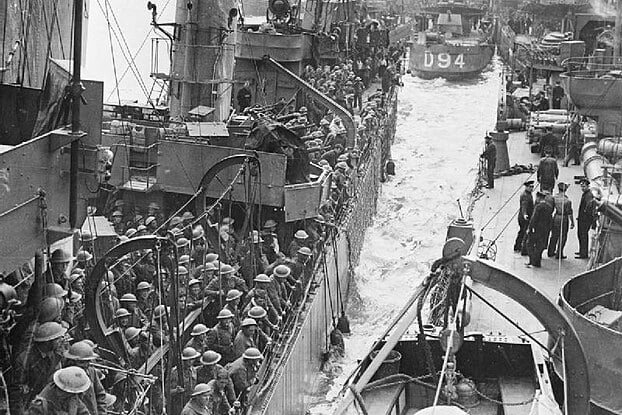
An interesting and stranger than fiction episode that Mrs Lake divulged about her husband’s time in Dunkirk involved, bizarrely enough, a truck loaded with the finest French champagne.
“Richard and his troop’s main job during Dunkirk was to blow up any bridges they crossed as they retreated, to prevent the Germans from using them,” she explained.
“On their way to the beach, they had hardly any supplies, but funnily enough they did come across a rail truck in a deserted station full of many cases of champagne, which they then took with them.
“Consequently, because there was such a scarcity of water on the Dunkirk beaches, for a number of days Richard and his men lived on nothing but champagne and army biscuits. They even shaved in champagne, whilst all the time being under constant fire and bombardment.”
In the confusion and chaos that occurred immediately after and around Dunkirk, with an estimated 316,663 British and French servicemen scattered throughout the UK, Richard found himself billeted in Reading for a short while, where his wife went to visit.
One Sunday as they were taking a picnic on a hill, Mrs Lake explained, “Richard had just returned from Dunkirk, and he would not talk of it, except that one afternoon on that Reading hill when he just turned and touched my sleeve and said, ‘Can you hear the guns? They’re in France.’ And I listened, and do you know I could hear them booming away across the channel. To this day it still sends a shudder through me to think of it.”
Before Richard was sent back overseas, another notable story that Mrs Lake related is one evening in Essex when she and her husband went to the cinema.
“I remember coming out of the local cinema one night, when the single chinks of lights caused by the departing audience through the heavy black-out curtains of the entrance, was spotted by a single Jerry aircraft which subsequently dropped a ‘stick’ (three bombs).
Richard immediately recognised the sound of the enemy engine, and the whistling noise of the fast-descending bombs, before shouting ‘down’ and dragging me into the gutter with him.
“The gutter was just outside a huge plate-glass window of a motor-car salesroom and I shall always recall the white-hot flash sensation penetrating my brain, even though’ our faces were pressed to the ground.
“I remember the glass splinters being everywhere, in our clothing and hair but no real harm was done.
“After that scare, and because I was pregnant, I mostly slept under a heavy dining table from then on.”
Shortly after Richard was posted to Preston to assemble his Royal Engineers unit for overseas.
Following an unaccompanied voyage of over six weeks via Halifax, Newfoundland, West Indies, Capetown, and Durban to Suez in U-boat-infested waters on board the S.S. Stratheden, Richard’s role in the North Africa campaign began.
Mrs Lake said, “When you consider the time and what was happening in the world, we were so lucky to be able to receive these letters, and it really was amazing how marvelously quick and reliable the post actually was. Being able to receive and send letters made such a difference to all those who were involved in the war effort.”
Below are the excerpts from a series of letters that tell their own unique tale in a war filled with such unique tales, and one that Mrs. Lake kindly agreed to share so that her and her husband’s sacrifice, and the millions like them, will never be forgotten.
Excerpt of letter from ‘Lynthorpe’, Altrincham
(4.7.41.) I am very sorry that I have not written before this week. I have been a bit miserable here for the first day or two as H.Q. found everything wrong they could with my section. They have two suits of battle-dress and of course, the working suits of my fellows get very greasy owing to the nature of their work. Well, the C.O. sent an Officer up to inspect, and they were all scruffy in their working suits. This shocked everyone to the core and the C.O. said discipline was very slack and disapproves of me now. But as they showed no inclination to understand or appreciate the problems confronting a workshop section when suddenly dragged off duty work on to spit and polish parade, I had got rather stuffy about it and maintained a somewhat aloof attitude.
Excerpt of Letter from Southend-On-Sea before leaving Britain (8.8.41.)
(8.8.41.) I was sorry to hear you dissolve into tears at the end of our telephone conversation tonight. It was nice discussing things that might have been together, but I didn’t want to make you sad; after all, we can’t all have soft jobs at home, somebody has got to fight this bloody war - think of the poor old Russians. So cheer up!
Excerpt of letters from Autumn 1941 on board the SS Stratheden.
For several days now we have been wearing tropical kit and perspiring profusely. The land here is rocky and covered with trees which manage to grow in the most impossible places. Shall I lose myself overboard, swim ashore, send you a cable to come out, and settle down here for the rest of the war?
The news last night was very bad. It sounds as though by the time this letter reaches you, the Germans will be in Moscow and the important part of Russia under their heel.
Excerpt of letters from North Africa.
(27.11.41)The day before yesterday there was a strong wind and the air was full of fine sand which filled one’s lungs and got into the food and everything. Yesterday we had a bit of practice on an open range with the Brengun. It was a very open range as the bullets, after passing through the target, sailed away with the pleasant whistling noise which bullets make when they are going away from one, over the desert, and into the ‘blue’.
(5.1.42) The climate here would actually be extremely pleasant at this time of the year, but for the beastly strong wind which makes camp life so difficult and blows the tents down and sand into everything.
(9.2.42) There is a funny story here about an Italian prisoner of war who worked in a hospital. He was let out in the evening but had to be back by 10 pm. One evening he was late and found the guard had shut the gate and wouldn’t let him in. So, condemned to a night in the desert, he sat down and wept bitterly.
My section played some Italian P.O.W.’s at football a week or two ago on a ground inside the POW camp. They have a very good team, so far unbeaten, and my Section 2 drew with them.
They got very excited about everything and cheered as if at a cup final, and one of the Italian spectators, thinking he was unobserved, slyly topped the ball into our goal when it came loose. The Italian thought they had scored a goal and cheered like mad, but the referee (one of my sergeants) had seen it, and so had the guard. He took the keys of the ‘solitary’ cell out of his pocket shook them, and called out “The next one to do that goes inside!” Well, I hope you are keeping well over there. I wonder how many more years of this blasted war I shall have to last out before I see you again?
(13.2.42) This war, as you say, seems to have gone all to hell in the last two months, but I hope the Russian success is not just a flash in the pan.
(19.4.42) Sometimes, as you say, the terribleness depresses me very deeply, and the complete absence of anything not beastly to look forward to for a long time. My aim, like yours, is our re-union and the re-commencement of a sane life, but I dare not think of it as anything but remote and I settle down to a weary plodding day-by-day life, because I lack the guts to maintain a note of high optimism throughout a war. You write about being invaded but I think it is possible that we shall be doing the invading eventually.
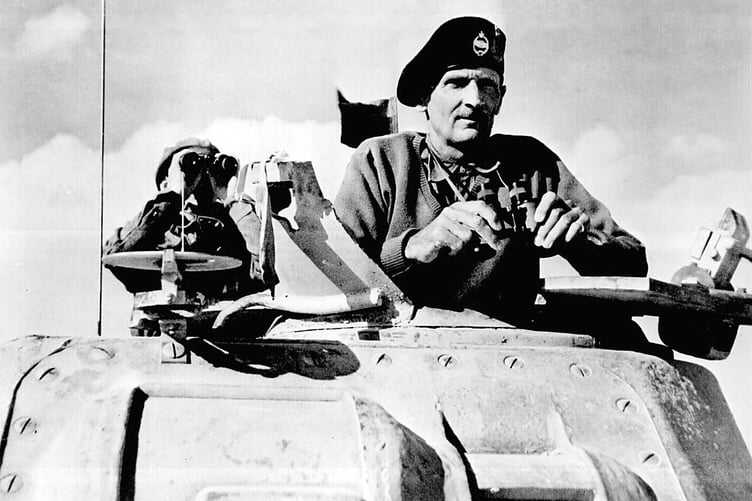
(21.4.42) There is a peculiar creature we call ‘Bertie’ who lives near the mess tent and sometimes pays us a visit. He is a sort of overgrown spider whose jaws work horizontally instead of vertically. “Q” says it is a tarantula but it isn’t much like the South American variety. He eats flies with much gusto so we haven’t killed him. He can’t see straight ahead so he crashes into tent poles and things. Lizards and scorpions abound in this land, and all insects and all of them nasty. Even the ordinary ‘house’ fly, which is of course more persistent altogether than the English variety, bites like a horse fly if left on long enough. We had a pest of ‘ladybirds’ last week in thousands and they bit too when they thought of it, but they are rather stupid.
(5.6.42) I am sitting on a camp stool in the only available shade which is that cast by the lorry I had fitted out as an office truck.
For about three hours in the middle of the day there is no shade at all and one just grills or gets underneath a vehicle.
I feel war-weary too at times, but I understand it is a subject which should be avoided if possible, so I never discuss it at length with you.
Where I am writing is a horrible place of scenery, flat and gritty and dirty and liberally sprinkled with smashed vehicles.
It is practically impossible to find a virgin piece of desert now. Everywhere there are old petrol cans and ammunition boxes and derelict vehicles are a frequent feature of the landscape.
When it is hot one gets a frightful thirst and I spend my leisure moments thinking affectionately of foaming tankards of English beer. Nothing else appeals quite so much; no ‘John Collins’ or ‘Pimm’s NO.1’ - it must be beer. And if we’re lucky there is an issue of one can per man per week.
(16.8.42) You can imagine what it is like to come back to the ruddy desert from leave. Dust and flies - what a life!
(15.10.42) It is blowing half a gale tonight and is so thick that it is impossible to see any stars, so finding one’s way about the desert is nearly hopeless. A compass is necessary for a walk of 100 yards or more.
(30.10.42) A long drawn-out banging match is taking place here. Last night I saw in the moonlight a Beau fighter get such a wizard burst in at a Jerry bomber. It shook the latter almost visibly. He dropped all his bombs together and dived off out toward the sea.
The fighter boys are extra-ordinary the way they land on a piece of desert covered with three-foot hillocks and tufts without killing themselves and smashing everything.
One landed in the middle of our leaguer not long ago, flat on his belly, and stopped dead.
The pilot jumped out and walked off to waggle his thumb on the track and get a lift back to the landing ground. Our barrage last night was something that has to be heard to be believed.
(17.3.43) I’m very sorry to hear about your friend in the Wellington and the other chap’s experiences. I have seen too many propellors sticking up out of the sand in the middle of nowhere, with a little wooden cross beside them, ever to have much enthusiasm for flying.
(24.4.43) Everything here is very different from the usual desert life and we are rapidly forgetting the latter. We now have green shrubs and trees and cultivation in every valley, and have to deal with mud and violent thunderstorms and heavy overcast skies, which never obtain in Egypt and Libya, or very seldom. I expect the Americans and 1st Army people were shocked to the core when they saw the Eighth Army in which despite many senior officers’ efforts to conventionalize it, there has always been a certain freedom of dress. So that odd combination of battle dress and Khaki drill, pink or fawn corduroy trousers, sheepskin coats, coloured neckerchiefs, and ‘gay’ caps are not infrequently seen. The ‘other people’ have even got boot polish which I have not been able to get for nine months.
At first, they stared aghast at our light yellow vehicles, which no longer blend with the country, but that has passed over now.
Have you seen the film ‘Desert Victory’ and is it good? Quite a number of the photographer chaps have been killed at different times.
(5.5.43) I cannot discuss religion with you properly in a letter. It is the sort of thing to save for more intimate moments. I suppose most soldiers have some hopes of a life after death, although they don’t think about it much, if at all. The great ruler in times of war is chance, and the all-important thing is to be lucky. One merely helps the shell or bomb or bullet will hit somebody else and it is difficult to see how religion can flourish in this sort of atmosphere. It is inevitable that somebody must be killed and yet everyone hopes to get through alive themselves, so it is underlined by the quintessence of selfishness, and the haphazard way in which the best and bravest are taken and the others left does not encourage any emulation of Galahad. I hope to get the matter in a better perspective when the war is over.
This campaign seems to be rapidly drawing to a close. We all wonder what will happen after, and speculation is rife.
(26.5.43) I don’t think I told you much about Tunis. It was nearly as big as Alex. The pavements were crowded with all nationalities and all types of French colonial troops as well as Empire and Dominion chaps from the 8th Army. The Americans, of course, swaggering like the deuce and shooting an enormous line about how well they had done to win the campaign. Without the help of French Colonial troops, the Yanks would never have taken an objective.
(27.5.43) Although there is so much to do I have had more inclination to take stock of the situation now, at the end of the campaign, and realise how much I love you and what a wretched thing it is that we are separated like this. General Montgomery has issued another Army Order to us all saying that although we would like to see our wives and families “We will see this thing through together, you and I”. So - that is final - we shall not come home now, until the end of the war with Germany.
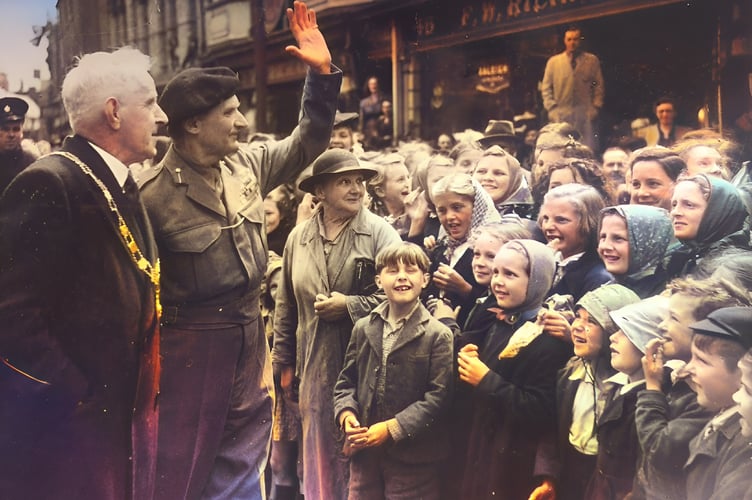
(29.5.43) It is during the darkness that one’s morale is lowest, that the possibility of a few enemy tanks getting through at night, or a deep patrol surprising you, or the confusion of a night move, or just the bloody aircraft, clawing at the air, and dropping ‘cracker-jacks’.
(17.6.43) I am still improving my swimming a little, in afternoon trips to the sea. Here is a funny story - A psychiatrist died and went to heaven. At the golden gate, he was met by St. Peter who took down his particulars. “Ah,” said the Saint, “A psychiatrist. I’ve been looking out for one of you fellows for some time. We have work for you here.” “What is the trouble?” asked the psychiatrist.
“We have been having a great deal of trouble lately with the Almighty,” said St. Peter. “He thinks he’s Montgomery.”
Following his role in the North African campaign, Richard went on to serve in Italy for the rest of war. His last letter to Erma was dated 29.9.45, and shortly after he was at long last reunited with the wife and child he had been separated from for so long.
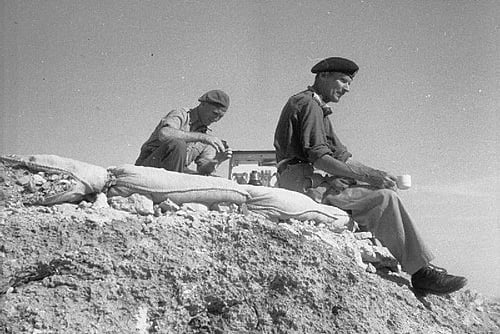
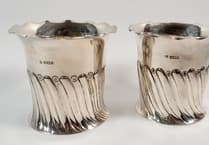



Comments
This article has no comments yet. Be the first to leave a comment.